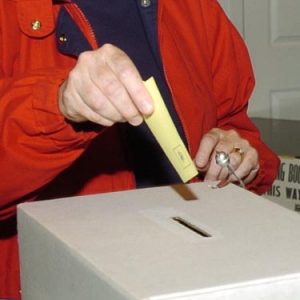Date Posted: April 11, 2011
Print Edition: April 8, 2011
By Sophie Isbister (Opinion Editor) – Email
 Another federal election looms, and with it, social media is all a-twitter with slogans like “Anyone but Harper,” and images displaying support for every party except the Conservative Party. With platform support for progressive issues seemingly spread out among the NDP, Greens, and Liberals, strategic voting looks more and more appealing to a pragmatic class of Canadians who are willing to bite the bullet and take one for the team.
Another federal election looms, and with it, social media is all a-twitter with slogans like “Anyone but Harper,” and images displaying support for every party except the Conservative Party. With platform support for progressive issues seemingly spread out among the NDP, Greens, and Liberals, strategic voting looks more and more appealing to a pragmatic class of Canadians who are willing to bite the bullet and take one for the team.
Strategic voting is the practice in which you cast a ballot for a party that you don’t necessarily support, simply because they will be the most likely to beat a party that you vehemently do not support. Typically in Canada the party-to-beat has been the Conservative Party, and the party that people have typically voted for in order to oust the Con candidate has been the Liberal party.
This is a fundamentally flawed distortion of Canadian democracy – though I understand the sentiment. However, ignoring minor parties that you may align yourself with merely because their riding is deemed “unwinnable” effectively turns the Canadian political landscape into a two-party system. The beauty of the Canadian electoral system is that we have an incredible amount of choice in who we vote for. Our leadership debates are not the back-and-forth Presidential debates seen in American politics; no, they function more as a round-table discussion, where diverse views are bandied about by four or five party leaders. Limiting oneself to voting for “the guy who is a little less evil than that guy, but still evil” strips one of their democratic rights.
Further, placing all your democratic credits into the hands of the party leaders takes emphasis off of the regional representatives who will actually be doing all the leg-work in your community. While it seems like it makes sense to vote for the person who may become Prime Minister, it’s also important to pay close attention to the person who will be doing advocacy work on behalf of your neighbourhood and who will (hopefully) represent the needs and interests of your specific community.
The internet and social media have given proponents of strategic voting the perfect platform from which to espouse their crafty points of view. They can encourage their friends to vote a certain way, they can identify specific ridings in which the Conservative party is weak, and they can even go so far as to create websites with handy maps and graphs and polls, all to further their agenda that your vote is ultimately meaningless and can be warped and altered to potentially manufacture a specific election outcome.
But the problem with the internet is that it can represent a very vocal minority. Not everyone is on the internet; the people in retirement homes – the ones most targeted by Stephen Harper, and the ones who campaign managers are planning to pick up and drive to the polls on Election Day – are not on the internet. The massive amount of old and older people who stand to benefit from Harper’s fiscally and socially conservative platform are the ones who are dusting off their walkers and casting ballots for who they really believe in. So even if the web-savvy targets of strategic voting campaigns actually devalue democracy enough to sully one of its major tenants (that your vote is your business and nobody else’s), there is no indication that casting your ballot based on polls and graphs actually works.
If students (a demographic that is so historically bad at showing up to vote that party platforms barely cater to them) actually turned up to vote, and voted for who they actually wanted to see represent them, the Canadian political landscape could start to look a lot more lush and vibrant. We wouldn’t need to vote for the lesser of two evils: we could vote for the good candidate, the one who worked their ass off to campaign to students and youth, and the one who is willing to do work in the community. We could do all this without feeling like we are throwing away our vote.


